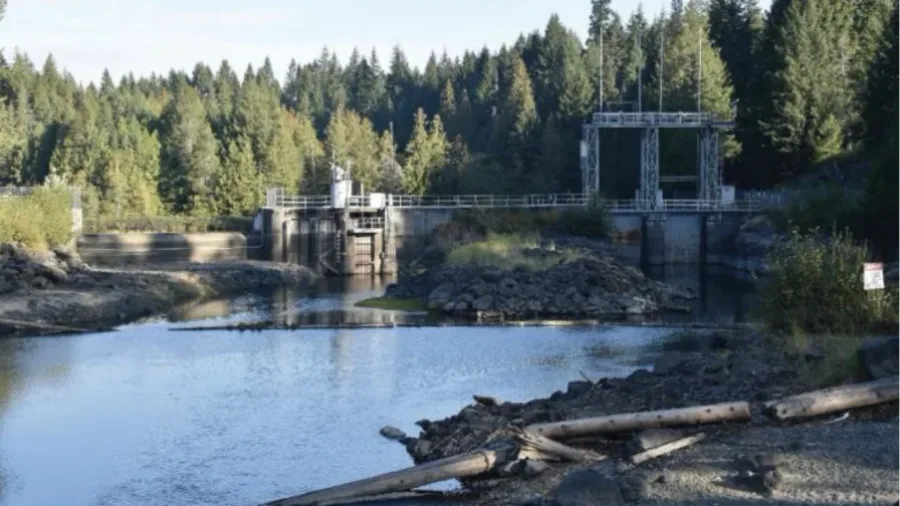
B.C. Hydro looks to protect fish as some reservoirs hit record-low levels
B.C. Hydro says drought conditions in the province have left some of its reservoirs at or near record-low levels.
While there is enough water at its larger facilities to meet the demand for power, the Crown utility says it has had to adapt to the impacts of climate change to keep fish alive downstream.
Spokesperson Mora Scott says B.C. Hydro has held back water in its reservoirs in anticipation of a possible drought.
"We have known that this can potentially be a problem for months, so we have been conserving water where we can so that we make sure that we're controlling that release of water, so that we don't see situations where we have rivers drying up and fish that are being killed," Scott said.

B.C. Hydro says the Comox Dam is among those experiencing low water levels. (B.C. Hydro)
SEE ALSO: Extreme drought shows no signs of easing in B.C. as records break
A new report titled "Casting drought" says the system at Campbell River has had the lowest water inflows for the month of September in 53 years. Water inflows in the Lower Mainland since the beginning of September are close to all-time lows.
To help manage water levels on Vancouver Island, B.C. Hydro reduced Puntledge River flows by one third last week. In Metro Vancouver, it reduced flows at Coquitlam by a third and at Ruskin/Stave by a quarter.
The report says while dry conditions have affected B.C. Hydro's watersheds, "natural river systems have fared worse than expected."
Thousands of dead wild salmon were found last week in the Neekas Creek, which runs through Heiltsuk Territory in the central coast region of the province.
"We're looking at pretty much 100 per cent mortality of all the salmon that were in the creek at that time," William Housty, conservation manager for the Heiltsuk Integrated Resource Management Department, said. "It's just unheard of at this time of year that we don't have rain."
Scott says B.C. Hydro is adapting how it does business as weather patterns become more unpredictable.
"We definitely believe that this is the impact of climate change," Scott said. "We have seen similar situations in the past but we haven't seen anything like this for at least 15 years. Events like this are becoming more frequent. It's obviously something that B.C. Hydro is paying very close attention to."
The Lower Mainland, Sunshine Coast and west Vancouver Island are experiencing Level 5 drought conditions — the most severe on the province's classification scale.
Scott hopes the situation will change soon.
"We know, based on historical records, that typically the rain does come by the end of October, and that's obviously what we're hoping for," she said.
"If that doesn't happen, then we will just continue to adapt what we've been doing to make sure that we continue to protect the fish downstream."
This article was originally published for CBC News. Contains files from Rafferty Baker, Christina Jung and The Canadian Press.